Flatworms - Study guides, Study notes & Summaries
Looking for the best study guides, study notes and summaries about Flatworms? On this page you'll find 226 study documents about Flatworms.
Page 2 out of 226 results
Sort by
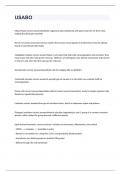
-
USABO exam 2024 with 100% correct answers
- Exam (elaborations) • 49 pages • 2024
- Available in package deal
-
- R326,07
- + learn more
Mycorrhizae correct answersSymbiotic organisms (aka symbionts) with plants that live on their roots, helping the plant gain nutrients Nerve net correct answersA nervous system that moves neural signals in all directions from the stimuli, found in invertebrates like hydra Malpighian tubules correct answersTubes in an insect that help with osmoregulation and excretion; they move waste into the main gut for removal. "Kidneys" of arthropods, they absorb ammonium and convert it into uric acid...
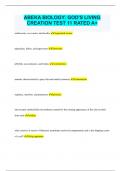
-
ABEKA BIOLOGY: GOD'S LIVING CREATION TEST 11 RATED A+
- Exam (elaborations) • 8 pages • 2024
-
- R148,96
- + learn more
earthworms, sea worms, and leeches segmented worms planarians, flukes, and tapeworms flatworms jellyfish, sea anemones, and hydras coelenterates animals characterized by spiny skin and radial symmetry echinoderms euglenas, amoebas, and paramecia protozoa microscopic multicellular invertebrates named for the rotating appearance of the cilia on their front ends rotifers what consists of stacks of flattened, membrane-enclosed compartments and is the shipping center of a cell? Golgi apparatu...
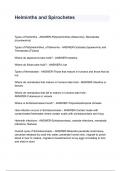
-
Helminths and Spirochetes questions and answers
- Exam (elaborations) • 10 pages • 2024
-
- R148,96
- + learn more
Types of Helminths - ANSWER-Platyhelminthes (flatworms), Nematodes (roundworms) Types of Platyhelminthes, of flatworms - ANSWER-Cestodes (tapeworms) and Trematodes (Flukes) Where do tapeworms take hold? - ANSWER-Intestine Where do flukes take hold? - ANSWER-Liver Types of Nematodes - ANSWER-Those that mature in humans and those that do not Where do nematodes that mature in humans take hold - ANSWER-Intestine or tissues Where do nematodes that fail to mature in humans take hold - ANSWE...
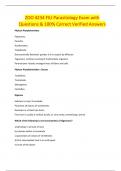
-
ZOO 4234 FIU Parasitology Exam with Questions & 100% Correct Verified Answers
- Exam (elaborations) • 21 pages • 2024
-
- R242,18
- + learn more
Phylum Platyhelminthes Flatworms. Parasitic. Acoelomates. Tripoblastic. Dorsoventrally flattened- greater S.A to respire by diffusion. Tegument- surficial covering of multicellular organism Parenchyma- loosely arranged mass of fibers and cells Phylum Platyhelminthes- Classes Turbellaria. Trematoda. Monogenea. Cestoidea. Digenea Subclass to class Trematoda. Parasitize all classes of vertebrates. Develops in at least two hosts. First host is usually a mollusk (snail), or very rare...
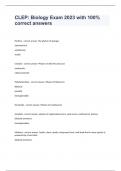
-
CLEP: Biology Exam 2023 with 100% correct answers
- Exam (elaborations) • 24 pages • 2023
- Available in package deal
-
- R307,43
- + learn more
Porifera - correct answer -the phylum of sponges asymmetrical ectothermic sessile Cnidaria - correct answer -Phylum of Jelly fish and coral exothermic radial symmetry Platyhelminthes - correct answer -Phylum of flatworms Bilateral parasitic hermaphroditic Nematoda - correct answer -Phylum of roundworms Annelida - correct answer -phylum of segmented worms: sand worms, earthworms, leeches bilateral symmetry hermaphrodites Mollusca - correct answer -(snails, clams, squids...
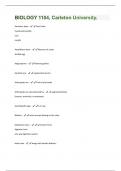
-
BIOLOGY 1104, Carleton University (Questions & Answers) Rated 100%
- Exam (elaborations) • 6 pages • 2024
- Available in package deal
-
- R148,96
- + learn more
Amniotes have - Four limbs Fused pelvic girdle ears no gills Amphibians have - Absence of scales shelled egg Angiosperms - flowering plants Annelids are - segmented worms Arthropods are - First land animals Arthropods are characterized by - segmented body (insects, arachnids, crustaceans) Australopiths age - 4-2 mya Bilatera - most animals belong to this class. bilaterians have: - symmetric form digestive tract one way digestive system birds have - wings with keratin featherslack...
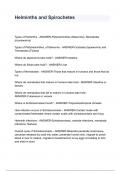
-
Helminths and Spirochetes test with complete solution
- Exam (elaborations) • 10 pages • 2024
-
- R148,96
- + learn more
Types of Helminths - ANSWER-Platyhelminthes (flatworms), Nematodes (roundworms) Types of Platyhelminthes, of flatworms - ANSWER-Cestodes (tapeworms) and Trematodes (Flukes) Where do tapeworms take hold? - ANSWER-Intestine Where do flukes take hold? - ANSWER-Liver Types of Nematodes - ANSWER-Those that mature in humans and those that do not Where do nematodes that mature in humans take hold - ANSWER-Intestine or tissues Where do nematodes that fail to mature in humans take hold - ANSWE...
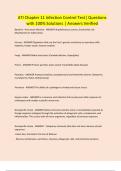
-
ATI Chapter 11 Infection Control Test| Questions with 100% Solutions | Answers Verified
- Exam (elaborations) • 13 pages • 2024
-
- R242,18
- + learn more
Bacteria - that cause infection - ANSWER Staphylococcus aureus, Escherichia coli, Mycobacterium tuberculosis Viruses - ANSWER Organisms that use the host's genetic machinery to reproduce (HIV, hepatitis, herpes zoster, herpes simplex) Fungi - ANSWER Molds and yeasts (Candida albicans, Aspergillus) Prions - ANSWER Protein particles (new variant Creutzfeldt-Jakob disease) Parasites - ANSWER Protozoa (malaria, toxoplasmosis) and helminths (worms, flatworms, roundworms, flukes (Schistosoma)
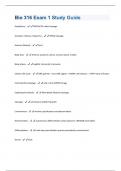
-
Bio 316 Exam 1 Study Guide Questions And Answers With Latest Solutions
- Exam (elaborations) • 6 pages • 2024
- Available in package deal
-
- R148,96
- + learn more
Amphibians - DISPLACED radial cleavage Annelids, molluscs, flatworms - SPIRAl cleavage Anterior (Rostral) - front Body Axes - Anterior, posterior, dorsal, ventral, lateral, medial Body planes - sagittal, horizontal, transverse Cellular Life Cycle - ONE gamete -> join ONE zygote -> MANY cell embryos -> VERY many cell types Centrolecithal cleavage - yolk in the CENTER of egg Cephalopod mollusks - Meroblastic bilateral cleavage Cleavage - cell division withOUT growth Commitment - ...
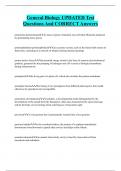
-
General Biology UPDATED Test Questions And CORRECT Answers
- Exam (elaborations) • 22 pages • 2024
-
- R158,28
- + learn more
protonema (protonemata)a mass of green, branched, one-cell-thick filaments produced by germinating moss spores protonephridium (protonephridia)an excretory system, such as the flame bulb system of flatworms, consisting of a network of tubules lacking internal openings proton-motive forcethe potential energy stored in the form of a proton electrochemical gradient, generated by the pumping of hydrogen ions (H+) across a biological membrane during chemiosmosis protoplastthe living part o...

That summary you just bought made someone very happy. Also get paid weekly? Sell your study documents on Stuvia! Discover all about earning on Stuvia


